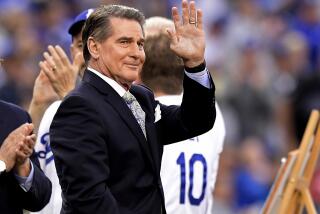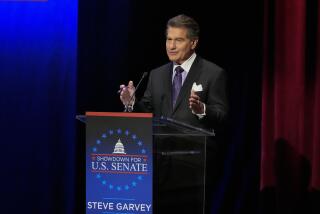If New Ideas Resonate, Hart May Run Again
- Share via
WASHINGTON — The one-time candidate of the future wants to show he isn’t a man of the past.
In the 1980s, then-Sen. Gary Hart of Colorado, under the banner of “new ideas,” led a drive to revamp the Democratic Party’s agenda. He was an early favorite to win the party’s 1988 presidential nomination, but saw his ambitions derailed by scandal.
Now, in an unexpected resurrection, he says he is “testing the waters” for a White House bid in 2004 and will deliver a series of policy speeches over the next six weeks to determine whether he can build sufficient support to run.
“The issue is, do you have something to say that is not being said?” Hart, now a Denver lawyer, said in an interview with the Los Angeles Times. “I think particularly in the national defense and homeland security areas, I have a unique voice.”
The 66-year-old Hart said he would decide whether to enter the Democratic race in March, after assessing the reaction to his speeches on national security, foreign policy, the economy and civic engagement.
Speeches a Barometer
The decision, he said, will turn on “public response to the speeches, what the other candidates are saying, and whether what I have to say is sufficiently different to justify speaking on my own.”
In conversation, however, it is clear that Hart is strongly drawn toward the possibility of running. He has begun to explore how he might run a “volunteer, low-budget, small-dollar, mass democracy” campaign, and he said he believes he is better prepared to serve as president today than when he sought the Democratic nomination in 1984 and 1988.
“I’ve seen things that I didn’t have the chance to when I was [in the Senate],” he says. “I still have the same energy level, and I have 15 years more experience.”
In another measure of his interest, Hart’s supporters on Sunday opened a Web site -- www.garyhartnews.com -- to provide information about the prospective campaign and begin building a network of enthusiasts. Hart also appeared Sunday on ABC’s “This Week” to discuss a possible campaign.
In his heyday during the 1980s, Hart was what Bill Clinton became in the 1990s: the leader of the forces inside the Democratic Party seeking alternatives to conventional liberalism. Hart’s “neo-liberal” agenda tried to move Democrats to the center on economics -- emphasizing growth over income redistribution -- and offered ambitious ideas on military reform while maintaining traditionally liberal positions on most social issues.
After having come close to swiping the ’84 Democratic presidential nomination from front-runner Walter F. Mondale, Hart saw his bid for the ’88 nomination sunk by revelations about his relationship with model Donna Rice. Hart was forced from the 1988 race under a hailstorm of ridicule and criticism, and, after a brief and unsuccessful reentry into the contest, he disappeared from public view for much of the next 15 years.
Hart began to reemerge through his work on the U.S. Commission on National Security for the 21st Century, which he co-chaired with former Sen. Warren Rudman (R-N.H.). The commission warned, in a January 2001 report, that the United States was vulnerable to a massive terrorist attack -- a conclusion that seemed grimly prophetic after the assault on the World Trade Center and the Pentagon eight months later.
While many Democratic professionals believe a Hart comeback bid for the nomination would face long odds, the idea is attracting surprising interest among some of his supporters from the 1980s, as well as enthusiastic younger activists.
“Initially, I think people were not sure what to make of it,” said Will Kanteres, a leading New Hampshire Democratic activist who supported Hart in both his previous presidential races. “Now there’s thinking [that] maybe we should listen to this guy.”
In a CNN/USA Today/Gallup Poll of registered Democrats on the 2004 race earlier this month, Hart drew 6%. That was more than former Vermont Gov. Howard Dean, who is actively running, but well behind the top-tier candidates: Sens. Joseph I. Lieberman of Connecticut, John Edwards of North Carolina and John F. Kerry of Massachusetts, and Rep. Richard A. Gephardt of Missouri.
“If he actually did do it, I think he would be a factor on the ideas level and the media attention level, but I don’t think he’ll resonate with today’s voters,” said a top advisor to another Democratic contender. “He has been out of the picture for so long, I don’t think most people will feel a connection to him.”
Hart first began considering the race last spring at the urging of two young Rhodes scholars whom he met while pursuing a doctorate in politics at Oxford University in 2000. The duo, Will Polkinghorn and Antwaun Smith, peppered Hart with memos and e-mails, contacted former supporters, floated the idea in the media and generally ignited enough of a fire to draw Hart toward the flame.
“Basically, we felt that Republicans have traditionally been strong on national security but weak on domestic stuff, Democrats weak on national security and strong on domestic stuff, and Gary represented somebody who had strength in both areas.” said Smith, who is now working in Hart’s Denver office.
Hart’s speaking tour is scheduled to begin Tuesday with a speech on national security at the Council on Foreign Relations in New York; he will then make stops in Iowa, San Francisco, New York City and Boston.
After 15 years mostly on the sidelines, Hart has stored up plenty to say.
He is withering in his criticism of President Bush, particularly in the area where the president receives the highest marks in opinion polls: his handling of the terrorism threat. Hart said that while Bush deserves credit for “rallying the country after Sept. 11,” he has failed to make the more sweeping changes needed to safeguard the nation against further attacks.
Homeland Security
“This president has abdicated his responsibility for protecting this country,” Hart charged. “We are going to war in Iraq. There will be inevitable retaliatory attacks, and this country is not prepared. What he has not done on homeland security is shameful.”
Specifically, Hart says the administration has failed to move aggressively enough on a long series of potential vulnerabilities, from training local police and fire officials to safeguarding ports.
Hart opposes an invasion of Iraq unless the U.N. inspectors find evidence of both weapons of mass destruction and viable plans to use them against the United States. Instead, he said, the U.N. should continue its policy of “coercive inspections,” perhaps by stationing a permanent military force inside Iraq to ensure it does not develop prohibited weapons.
Like all his potential Democratic rivals, Hart wants the United States to move more quickly toward reducing dependence on Middle East oil and would roll back Bush’s tax cut; unlike any of his rivals, he said he was considering proposals for shifting reliance from the income tax to a consumption tax. Hart said such a tax, similar to a sales tax, could be structured to impose higher burdens on the affluent, rather than on lower-income families.
Oxford Thesis
Hart’s biggest domestic idea draws on his thesis at Oxford, which he recently converted into a book, “Restoration of the Republic.” In the book, which tries to adapt proposals by Thomas Jefferson to the 21st century, Hart argues for radically devolving authority for administering a variety of federal domestic programs -- from education to health care -- to local communities. The goal would be to not only improve the delivery of services but also restore civic engagement by requiring “citizens [to] assume responsibility for the common good,” as he writes.
Hart first emerged as a national political figure in 1972, when he managed Sen. George S. McGovern’s insurgent presidential campaign. Two years later, Hart won his Senate seat.
Since leaving the public stage after the 1988 race, Hart has written seven books, two of them novels under pseudonyms. He also joined the international law firm Coudert Brothers, primarily helping clients “develop new projects abroad in telecommunications, infrastructure and energy,” with a focus on Russia and Eastern Europe, he said.
Hart said if he runs again, he is ready to answer questions about Rice and the events that forced him from the 1988 race. But he says he does not believe most voters will judge him solely on those actions, especially after the personal scandals that have since rocked Washington. Hart and his wife, Lee, have been married for 44 years; he said on ABC that she had “put [the scandal] behind her.”
“I made one bad judgment and I paid for it,” he said. “Now the issue is: Was it so revealing of my character as to prohibit me from serving the public for the rest of my life? I’m sure there are those who think yes. But I think the vast number of citizens I know, and even editorial writers, would say no.”
Character, Hart added insistently, “is revealed over a lifetime, and I am willing to put my character on the line as revealed over a lifetime.”
More to Read
Get the L.A. Times Politics newsletter
Deeply reported insights into legislation, politics and policy from Sacramento, Washington and beyond. In your inbox twice per week.
You may occasionally receive promotional content from the Los Angeles Times.










